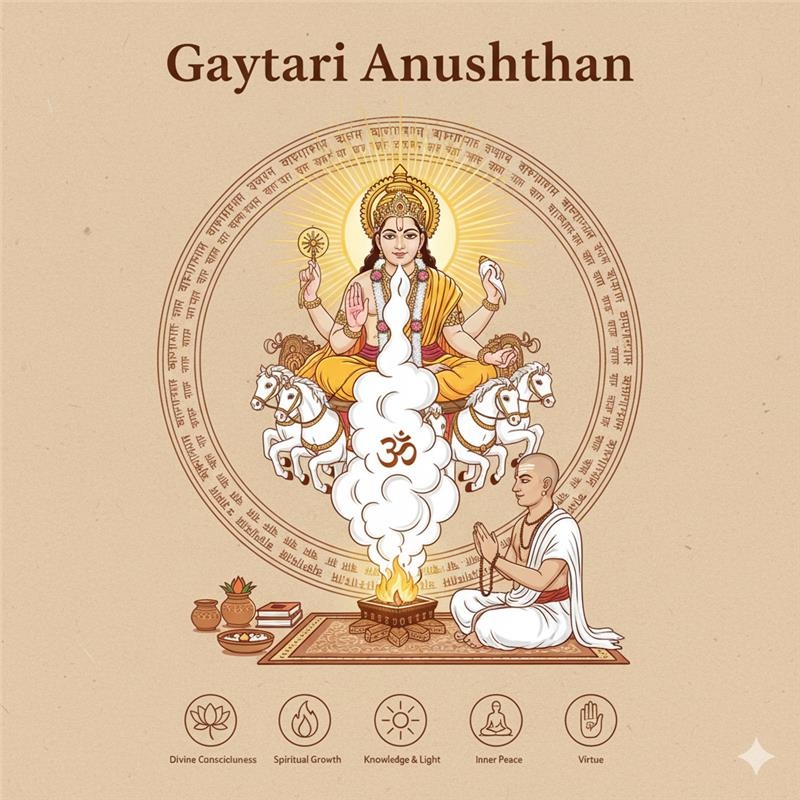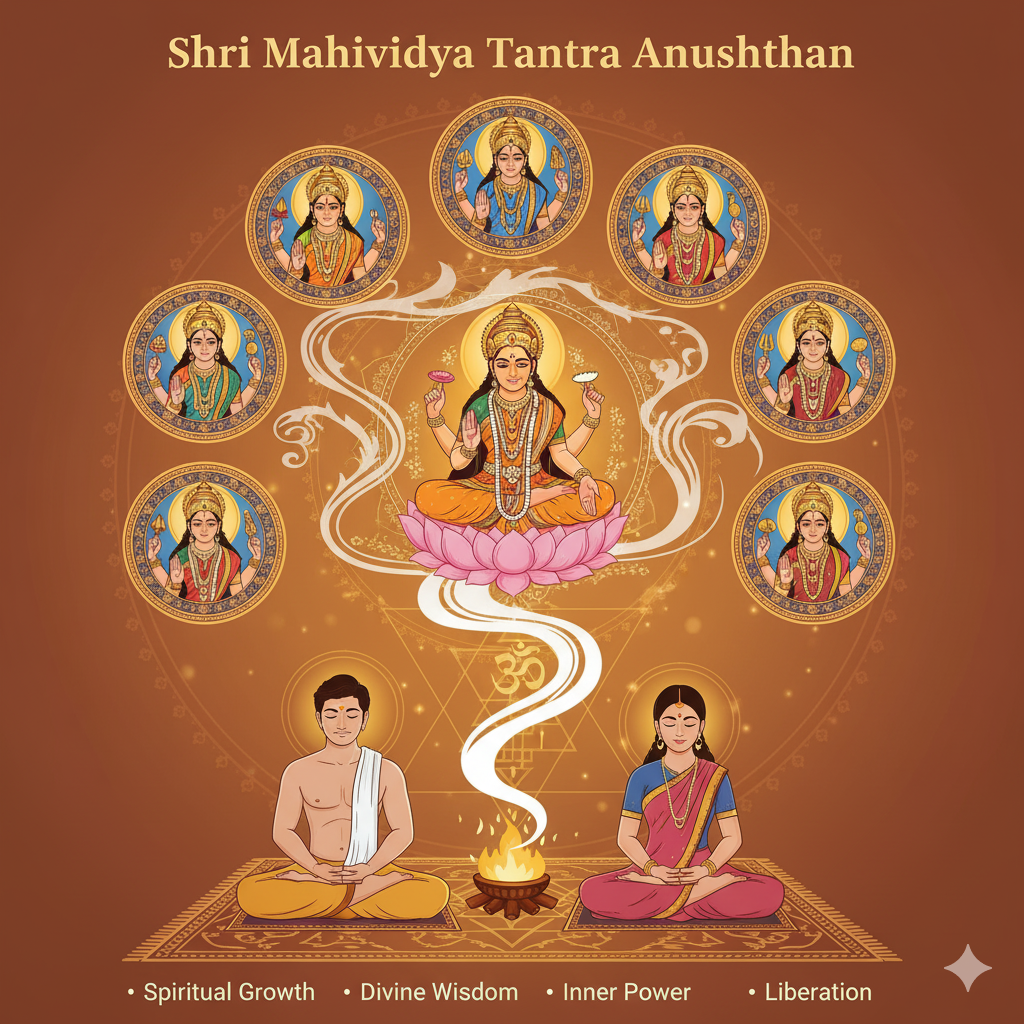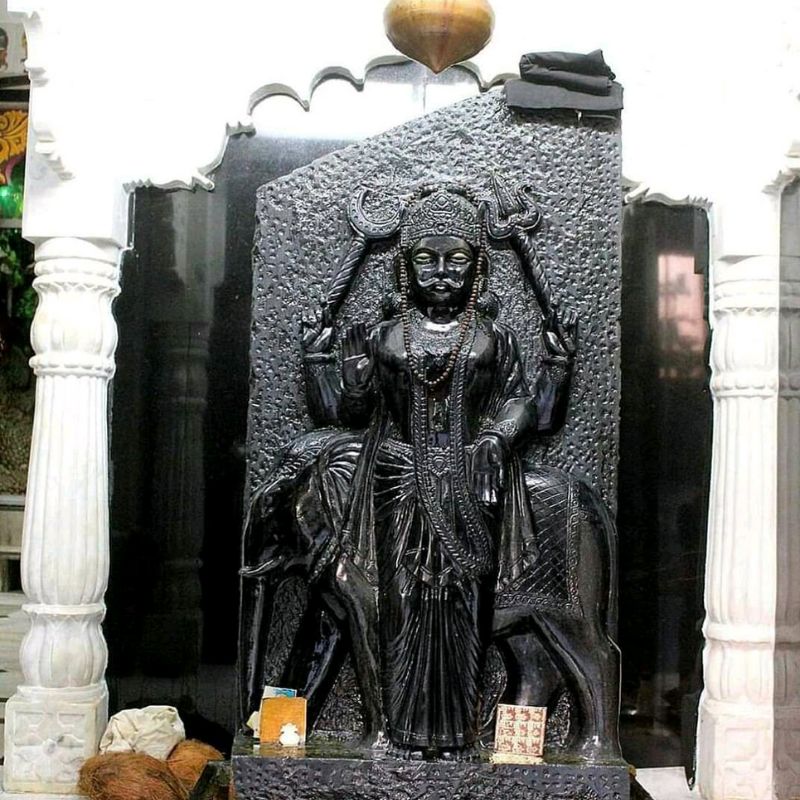Tatva Shudhi Anusthan
Connecting You with the Divine Through Sacred Rituals
Through holy Anushthans, we invoke divine blessings, neutralize negative influences, and realign your inner and outer energies to create harmony in every aspect of life.
What is Anushthan (Anusthanam)?
“Anushthanam” is a Sanskrit word, known in Hindi as “Anushthan”, referring to a sacred ritual or ceremonial spiritual practice in Hinduism.
Derived from the Sanskrit roots ‘Anu’ (meaning continuous or constant) and ‘Sthana’ (meaning place), the term Anushthan signifies a disciplined, devoted practice performed at a specific place and time to invoke divine energies and spiritual transformation.
Anushthan typically involves recitation of sacred mantras, Vedic chants, prayers, and ritual offerings. It is performed with deep faith and purity of intention, often under the guidance of experienced priests or spiritual masters.
Purpose and Meaning of Anushthan
In Hindu tradition, Anushthan is performed to:
- Seek divine blessings and guidance
- Purify the mind, body, and environment
- Overcome obstacles, negativity, or karmic imbalances
- Promote peace, prosperity, and protection
- Attain spiritual growth and self-realization
Anushthans are often undertaken during important life events such as marriages, childbirth, housewarming (Griha Pravesh), or during spiritual milestones.
They are also performed to honor specific deities, celebrate festivals, or fulfill spiritual vows.
Types of Anushthan
Anushthans vary in scale, purpose, and duration depending on individual needs and intentions. They are generally categorized as follows:
1. Small Anushthan
Performed individually or within a family setting, these involve simple rituals such as daily puja, mantra chanting, or fasts (vrata).
2. Medium Anushthan
More elaborate ceremonies conducted by trained priests, often including fire rituals (havan/yajna) and group participation. These are performed for specific spiritual or remedial purposes such as health, prosperity, or planetary balance.
3. Big Anushthan
Large-scale spiritual or cultural events requiring extensive preparation, multiple priests, and community participation. Examples include Chandi Anushthan, Rudra Abhishek, Navgraha Shanti, or Maha Mrityunjaya Yajna.
These are conducted for collective well-being, purification, and universal harmony.
Importance of Anushthan
The practice of Anushthan holds deep spiritual, emotional, and social significance in Hindu culture:
- Spiritual Connection – Strengthens one’s bond with divine energies and higher consciousness.
- Personal Growth – Promotes inner discipline, faith, and emotional balance.
- Atonement & Purification – Helps cleanse negative karma and purify one’s aura and surroundings.
- Blessings & Divine Grace – Invokes prosperity, peace, and spiritual protection.
Community & Harmony – Brings people together through shared devotion and collective energy.
The Essence of Anushthan
Anushthan is not merely a ritual — it is a spiritual journey of dedication, purification, and divine connection.
By performing an Anushthan with sincerity and devotion, one aligns with cosmic energies, attains mental peace, and welcomes positive transformation in life.
Lastest Videos
FAQs
Anusthan Frequently Asked Questions (FAQ)
Sacred Rituals • Divine Connection • Spiritual Harmony
— by Tatvashudhi.in
Anushthan (Anusthanam) is a sacred Vedic practice of devotion, prayer, and ritual performed with discipline, purity, and divine intention.
At Tatvashudhi, our Anushthans are conducted to help individuals and families connect with divine energies, remove negativity, and attract peace, prosperity, and spiritual upliftment.
Each ritual is performed with authentic Vedic procedures, mantras, and offerings — aligning your life with higher cosmic vibrations.
We offer a complete range of traditional and purpose-based Anushthan & Puja services, including:
- 🕉️ Chandi Anushthan – for strength, protection, and divine blessings
- 🔱 Maha Mrityunjaya Jaap & Anushthan – for health, healing, and longevity
- 🌸 Rudra Abhishek – to invoke Lord Shiva’s grace and balance planetary energies
- 🪷 Navgraha Shanti Puja – to remove doshas and balance grahas (planets)
- 🌿 Vastu Shanti Puja – for harmony in home or workplace
- 💰 Lakshmi Puja, Satyanarayan Katha, and Durga Puja – for wealth, well-being, and peace
Every ritual is customized as per your purpose, horoscope, and Sankalpa (spiritual intention).
Booking is simple — you can:
- Fill out our online booking form on Tatvashudhi.in
- Or contact us directly via phone, WhatsApp, or email
Once we receive your details (name, purpose, and birth information), our spiritual team will select the best muhurat (auspicious time) and arrange everything with care and devotion.
Yes 🙏
We offer online Anushthan and Puja services so devotees worldwide can participate in the rituals via video call (Zoom, Google Meet, or WhatsApp).
Our trained priests perform each ceremony in your name and Sankalpa, and after completion, you receive:
- Photos or video recordings
- Sacred prasad (where applicable)
- Ritual summary or puja report
To ensure a personalized and effective ritual, we usually ask for:
- Your full name and Gotra (if known)
- Date, time, and place of birth (for muhurat and astrological alignment)
- The purpose of the Anushthan (health, peace, prosperity, marriage, etc.)
- Your preferred date or schedule
These help our priests perform your Sankalpa accurately and align the energies with your goals.
Astrology is a science of planets and cosmic energy. It is not tied to any particular religion and can be beneficial to people of all faiths.
The duration depends on the type and scale of the ritual:
- Simple pujas: 1–2 hours
- Medium Anushthans (e.g., Rudra Abhishek, Graha Shanti): 1–3 days
- Major Anushthans (e.g., Chandi, Maha Mrityunjaya): 5–11 days
All ceremonies are performed by qualified and experienced Vedic scholars under traditional guidelines.
Absolutely. Every puja and anushthan at Tatvashudhi is conducted by trained Vedic priests who follow authentic Shastra-based procedures using sacred mantras, rituals, and pure samagri (materials).
We ensure spiritual accuracy, purity, and sanctity in every step.
Yes. Specific Anushthans like Rudra Abhishek, Navgraha Shanti, or Chandi Path are performed to neutralize malefic planetary influences, cleanse negative energies, and restore spiritual balance.
These rituals help invite peace, clarity, protection, and prosperity into one’s life.
Yes, we perform customized Anushthans and Pujas for auspicious events such as:
- Griha Pravesh (Housewarming)
- Marriage & Anniversary
- Business or Shop Opening
- Birthdays or New Ventures
Festivals (Diwali, Navratri, etc.)
Each ceremony is designed to invoke divine blessings and ensure auspicious beginnings.
Performing regular pujas and anushthans helps you:
- Purify your mind, home, and aura
- Attract positive vibrations and abundance
- Strengthen your spiritual connection
- Overcome karmic or planetary challenges
Cultivate peace, focus, and divine protection
Yes, depending on your location, we can perform on-site Anushthan and Puja at your home, temple, office, or community space.
For devotees outside India or those unable to attend physically, we offer online and temple-based ceremonies conducted in your name.
The cost varies based on:
- The type and scale of the ritual
- Number of priests involved
Duration and materials (samagri) required
Once you share your purpose and details, our team will provide a transparent quotation — with all arrangements included.
Yes. After completion, you receive:
- Sacred Prasad (as per availability)
- Photographs or video recording of the ritual
A detailed Puja/Anushthan report mentioning the mantras, deities invoked, and spiritual significance of the ceremony performed.
Still Have Questions?
You may reach us at tatvashudhi.in@gmail.com or call/ whatsapp on+91 915050304
Our team will guide you with devotion and care to choose the right Anushthan or Puja for your spiritual and personal needs.
Tatvashudhi – Nurturing Balance, Purity & Divine Harmony
At Tatvashudhi, we believe every ritual is a sacred opportunity to restore balance between body, mind, and soul — bringing divine blessings to every home and heart.
🙏 Namaskar – May your path be filled with light, peace, and positive energy.












